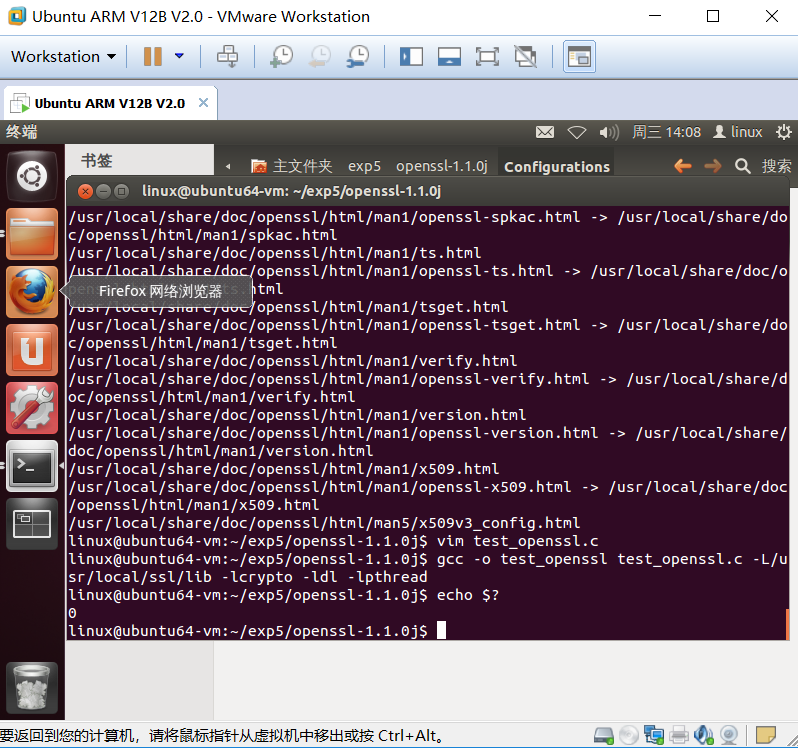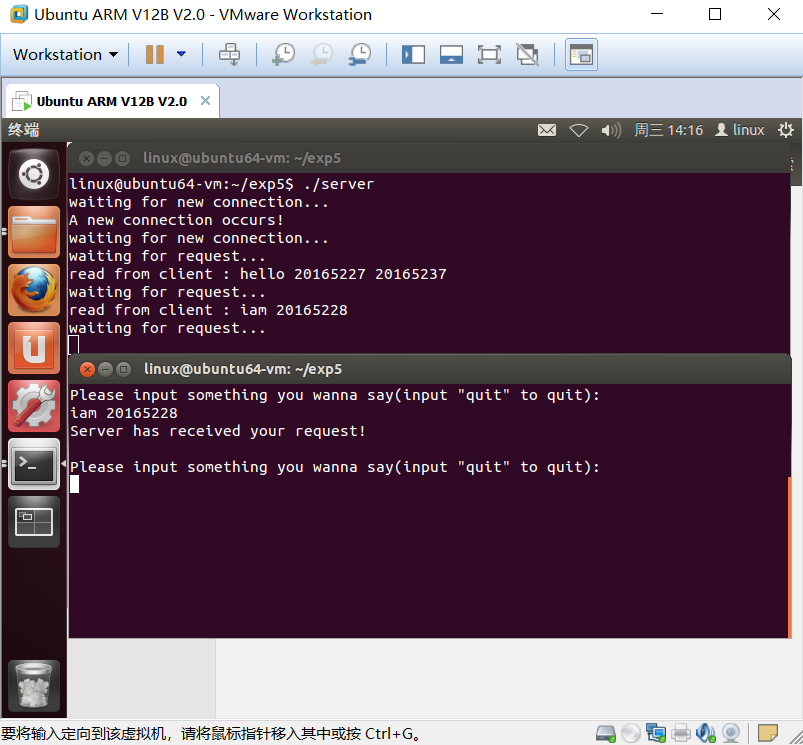2018-2019-1 20165307 20165327 20165332 实验五 通讯协议设计
Linux下OpenSSL的安装与使用
1.两人一组
2.基于Socket实现TCP通信,一人实现服务器,一人实现客户端
3.研究OpenSSL算法,测试对称算法中的AES,非对称算法中的RSA,Hash算法中的MD5
4.选用合适的算法,基于混合密码系统实现对TCP通信进行机密性、完整性保护。
实验步骤
在OpenSSL下载地址下载OpenSSL
解压OpenSSL源代码 tar xzvf openssl-1.1.0j.tar.gz
进入源代码目录后
$ ./config
$ make
$ make test
$ make install
编写测试代码 test_openssl.c
#include <stdio.h>
#include <openssl/evp.h>
int main(){
OpenSSL_add_all_algorithms();
return 0;
}
编译和执行
结果打印0则表示安装成功

实现TCP通信
server.c:
#include<stdlib.h>
#include<pthread.h>
#include<sys/socket.h>
#include<sys/types.h> //pthread_t , pthread_attr_t and so on.
#include<stdio.h>
#include<netinet/in.h> //structure sockaddr_in
#include<arpa/inet.h> //Func : htonl; htons; ntohl; ntohs
#include<assert.h> //Func :assert
#include<string.h> //Func :memset
#include<unistd.h> //Func :close,write,read
#define SOCK_PORT 9988
#define BUFFER_LENGTH 1024
#define MAX_CONN_LIMIT 512 //MAX connection limit
static void Data_handle(void * sock_fd); //Only can be seen in the file
int main()
{
int sockfd_server;
int sockfd;
int fd_temp;
struct sockaddr_in s_addr_in;
struct sockaddr_in s_addr_client;
int client_length;
sockfd_server = socket(AF_INET,SOCK_STREAM,0); //ipv4,TCP
assert(sockfd_server != -1);
//before bind(), set the attr of structure sockaddr.
memset(&s_addr_in,0,sizeof(s_addr_in));
s_addr_in.sin_family = AF_INET;
s_addr_in.sin_addr.s_addr = htonl(INADDR_ANY); //trans addr from uint32_t host byte order to network byte order.
s_addr_in.sin_port = htons(SOCK_PORT); //trans port from uint16_t host byte order to network byte order.
fd_temp = bind(sockfd_server,(struct scokaddr *)(&s_addr_in),sizeof(s_addr_in));
if(fd_temp == -1)
{
fprintf(stderr,"bind error!
");
exit(1);
}
fd_temp = listen(sockfd_server,MAX_CONN_LIMIT);
if(fd_temp == -1)
{
fprintf(stderr,"listen error!
");
exit(1);
}
while(1)
{
printf("waiting for new connection...
");
pthread_t thread_id;
client_length = sizeof(s_addr_client);
//Block here. Until server accpets a new connection.
sockfd = accept(sockfd_server,(struct sockaddr_*)(&s_addr_client),(socklen_t *)(&client_length));
if(sockfd == -1)
{
fprintf(stderr,"Accept error!
");
continue; //ignore current socket ,continue while loop.
}
printf("A new connection occurs!
");
if(pthread_create(&thread_id,NULL,(void *)(&Data_handle),(void *)(&sockfd)) == -1)
{
fprintf(stderr,"pthread_create error!
");
break; //break while loop
}
}
//Clear
int ret = shutdown(sockfd_server,SHUT_WR); //shut down the all or part of a full-duplex connection.
assert(ret != -1);
printf("Server shuts down
");
return 0;
}
static void Data_handle(void * sock_fd)
{
int fd = *((int *)sock_fd);
int i_recvBytes;
char data_recv[BUFFER_LENGTH];
const char * data_send = "Server has received your request!
";
while(1)
{
printf("waiting for request...
");
//Reset data.
memset(data_recv,0,BUFFER_LENGTH);
i_recvBytes = read(fd,data_recv,BUFFER_LENGTH);
if(i_recvBytes == 0)
{
printf("Maybe the client has closed
");
break;
}
if(i_recvBytes == -1)
{
fprintf(stderr,"read error!
");
break;
}
if(strcmp(data_recv,"quit")==0)
{
printf("Quit command!
");
break; //Break the while loop.
}
printf("read from client : %s
",data_recv);
if(write(fd,data_send,strlen(data_send)) == -1)
{
break;
}
}
//Clear
printf("terminating current client_connection...
");
close(fd); //close a file descriptor.
pthread_exit(NULL); //terminate calling thread!
}
client.c:
#include<stdlib.h>
#include<sys/socket.h>
#include<sys/types.h> //pthread_t , pthread_attr_t and so on.
#include<stdio.h>
#include<netinet/in.h> //structure sockaddr_in
#include<arpa/inet.h> //Func : htonl; htons; ntohl; ntohs
#include<assert.h> //Func :assert
#include<string.h> //Func :memset
#include<unistd.h> //Func :close,write,read
#define SOCK_PORT 9988
#define BUFFER_LENGTH 1024
int main()
{
int sockfd;
int tempfd;
struct sockaddr_in s_addr_in;
char data_send[BUFFER_LENGTH];
char data_recv[BUFFER_LENGTH];
memset(data_send,0,BUFFER_LENGTH);
memset(data_recv,0,BUFFER_LENGTH);
sockfd = socket(AF_INET,SOCK_STREAM,0); //ipv4,TCP
if(sockfd == -1)
{
fprintf(stderr,"socket error!
");
exit(1);
}
//before func connect, set the attr of structure sockaddr.
memset(&s_addr_in,0,sizeof(s_addr_in));
s_addr_in.sin_addr.s_addr = inet_addr("127.0.0.1"); //trans char * to in_addr_t
s_addr_in.sin_family = AF_INET;
s_addr_in.sin_port = htons(SOCK_PORT);
tempfd = connect(sockfd,(struct sockaddr *)(&s_addr_in),sizeof(s_addr_in));
if(tempfd == -1)
{
fprintf(stderr,"Connect error!
");
exit(1);
}
while(1)
{
printf("Please input something you wanna say(input "quit" to quit):
");
gets(data_send);
//scanf("%[^
]",data_send); //or you can also use this
tempfd = write(sockfd,data_send,BUFFER_LENGTH);
if(tempfd == -1)
{
fprintf(stderr,"write error
");
exit(0);
}
if(strcmp(data_send,"quit") == 0) //quit,write the quit request and shutdown client
{
break;
}
else
{
tempfd = read(sockfd,data_recv,BUFFER_LENGTH);
assert(tempfd != -1);
printf("%s
",data_recv);
memset(data_send,0,BUFFER_LENGTH);
memset(data_recv,0,BUFFER_LENGTH);
}
}
int ret = shutdown(sockfd,SHUT_WR); //or you can use func close()--<unistd.h> to close the fd
assert(ret != -1);
return 0;
}
运行结果
